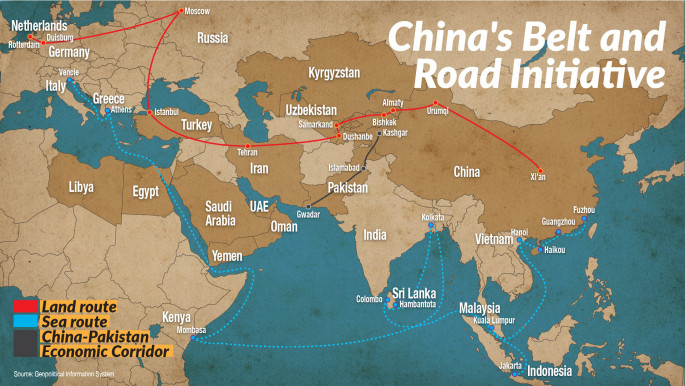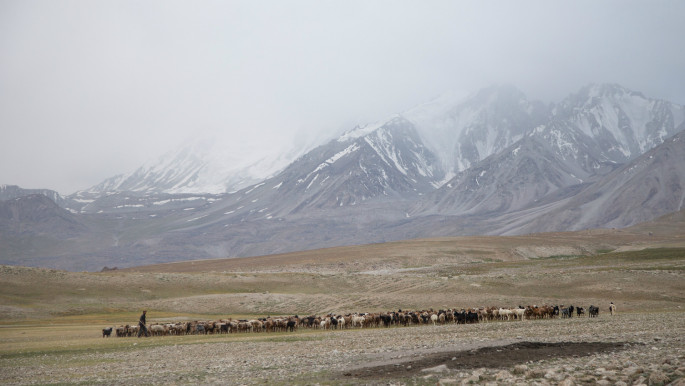Coronavirus brings a halt to China's trillion-dollar Belt and Road Initiative
The epidemic has sparked fears among states that come within the sphere or around the trade routes of China's trillion-dollar Belt and Road initiative (BRI) in South and Central Asia.
The outbreak has affected a host of projects under BRI in a number of countries. In some countries, these projects have come to a complete halt.
Chinese engineers and workers, who had gone home for the Lunar New Year holiday, have not been allowed to re-enter the host countries where they were working on several infrastructure projects related to BRI.
As a precautionary measure, Pakistani authorities asked Chinese engineers and labourers working on several projects related to the China-Pakistan Economic Corridor (CPEC) to extend their vacation to limit the spread of coronavirus.
The country has developed standard operating procedures (SOPs) and thermal scanners have been provided to health staff at the country's airports to screen all passengers.
The movement of Chinese officials working on CPEC projects is temporarily suspended as many of them were already on holiday due to the Chinese New Year.
Most of the engineers, as well as the labourers deployed at CPEC projects, are Chinese. The movement of all those who recently returned from China has been restricted and all must be screened until the situation improves.
In Bangladesh, the commissioning of a US $2.5 billion power project near the port of Payra has been delayed because Chinese workers who had gone home for the Lunar New Year holiday had been unable to re-enter Bangladesh.
Another US $1.1 billion road and rail bridge across the Padma River has become victim to the coronavirus outbreak.
 |
Chinese engineers and workers, who had gone home for the Lunar New Year holiday, have not been allowed to re-enter the host countries where they were working on several infrastructure projects related to BRI |  |
The project is the country's largest ever infrastructure development and it is being built by the China Major Bridge Engineering Company. Bengali authorities have stopped issuing on-arrival visas to Chinese visitors, and all Chinese citizens applying for regular visas would be required to provide medical certificates.
 |
|
Infrastructure projects under the BRI involve construction of more railways, highways and energy pipelines in Central Asia. These projects are set to break the transportation bottleneck for regional development and connect the Central Asian Republics (CARs) with the world market.
In Central Asia, Kazakhstan has closed a flagship border free-trade zone, and Tajikistan is screening arrivals with thermal scanners.
Kazakhstan has suspended all forms of passenger travel to and from China as the coronavirus outbreak sparks fears among China's neighbours. While the Central Asian nation has suspended issuing visas to Chinese citizens, the cross-border bus journeys have already been halted.
Energy-rich Kazakhstan is believed to be a key partner in China's BRI. Being a member of the Eurasian Economic Union, it has all the potential to play a pivotal role in promoting transcontinental trade.
The strategically located central Asian country is very important for China's BRI, as the country is a keystone of the land-based dimension of China's connectivity plan.
The coronavirus epidemic has also affected work on infrastructure projects in Tajikistan, which was one of the first participants that responded to the Silk Road Economic Belt as soon as it was proposed by President Xi Jinping in September 2013.
 |
|
| Read also: Is China set to play a greater role in Afghanistan? |
In the past two decades, China participated in over 50 large projects in Tajikistan, including the Lolazor-Khatlon and North-South power transmission lines, road construction projects and the construction of a tunnel under the Shar-Shar Pass on the road between Dushanbe and Kuljab. The BRI benefits the landlocked Tajikistan, which has limited access to seaports.
No propaganda campaign could damage or hamper China's ambitious BRI as the coronavirus outbreak has done in a month hampering the mega trade and infrastructure plan.
The US and Western powers have been criticising China's BRI on various grounds. China's BRI has come out as mega booster of Chinese influence across regions. Washington sees BRI not merely as an infrastructure development programme, but also perceives it as China's initiative to expand its military power globally by building military bases at strategic locations in different regions.
America's top diplomat for South Asia, Alice Wells last month warned Islamabad that the $60 billion CPEC flagship project of BRI would increase Pakistan's foreign debt burden and that companies blacklisted by the World Bank had got contracts in the CPEC.
In her speech at the Woodrow Wilson International Center in November, Wells for the first time attacked China for using the non-concessionary loans and its own labour and material in the mega infrastructure projects related to CPEC.
She warned Pakistan of the economic mess it could create in the country with a high unemployment rate.
China reacted to Wells' criticism and termed it as malicious calculations aimed at disrupting CPEC development and creating discord in China-Pakistan relations.
The CPEC would link western China with Gwadar Port in southwestern Pakistan through a network of highways, railways and gas pipelines.
Today, Pakistan has halted working on the ongoing project under CPEC, as the country initiates the screening process of 71 Chinese engineers and their security personnel in wake of the coronavirus outbreak in China.
The US was the first country to impose a travel ban on Chinese travellers and the first to suggest a partial withdrawal of its embassy staff. The Chinese government in return has accused the US of spreading fear instead of offering assistance to fight the deadly virus.
Syed Fazl-e-Haider is a contributing analyst at South Asia desk of Wikistrat. He is a freelance columnist and the author of several books including the 'Economic Development of Balochistan'





 Follow the Middle East's top stories in English at The New Arab on Google News
Follow the Middle East's top stories in English at The New Arab on Google News


